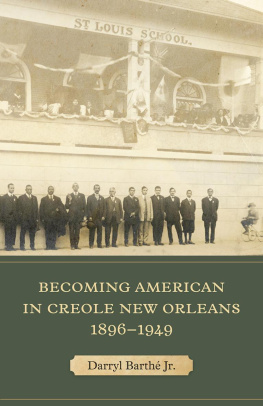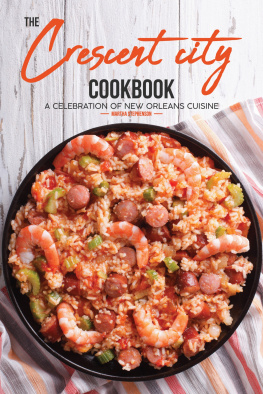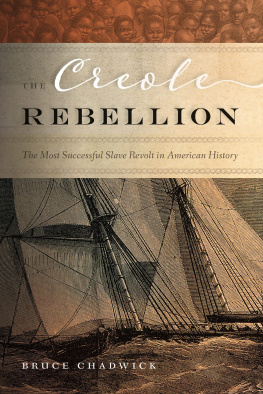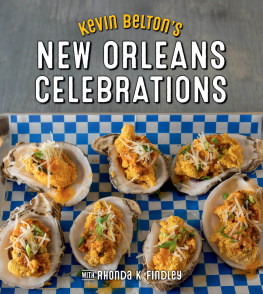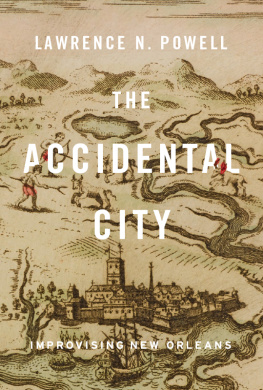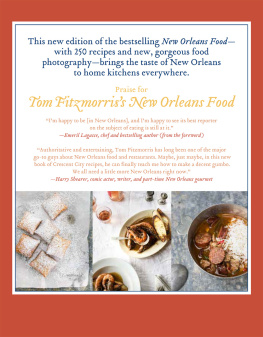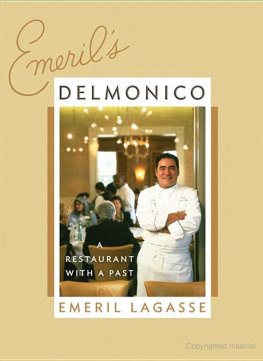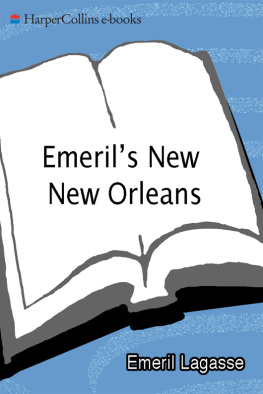BECOMING AMERICAN
IN CREOLE NEW ORLEANS
18961949
BECOMING AMERICAN
IN CREOLE NEW ORLEANS
18961949
Darryl Barth Jr.
LOUISIANA STATE UNIVERSITY PRESS
BATON ROUGE
Published by Louisiana State University Press
www.lsupress.org
Copyright 2021 by Louisiana State University Press
All rights reserved. Except in the case of brief quotations used in articles or reviews, no part of this publication may be reproduced or transmitted in any format or by any means without written permission of Louisiana State University Press.
Manufactured in the United States of America
First printing
Designer: Barbara Neely Bourgoyne
Typefaces: Vulpa, display; Whitman, text
Printer and binder: Sheridan Books
Front jacket illustration: Group photograph at the St. Louis School (Couvent School). Courtesy of Xavier University of Louisiana Archives and Special Collections.
Library of Congress Cataloging-in-Publication Data
Names: Barthe, Darryl, Jr., author.
Title: Becoming American in Creole New Orleans, 18961949 / Darryl Barthe Jr.
Description: Baton Rouge : Louisiana State University Press, 2021. | Includes bibliographical references and index.
Identifiers: LCCN 2020043800 (print) | LCCN 2020043801 (ebook) | ISBN 978-0-8071-7547-7 (cloth) | ISBN 978-0-8071-7552-1 (pdf) | ISBN 978-0-8071-7553-8 (epub)
Subjects: LCSH: CreolesLouisianaNew OrleansSocial life and customs20th century. | CreolesLouisianaNew OrleansHistory20th century. | Americanization. | CreolesEthnic identity. | New Orleans (La.)History.
Classification: LCC F380.C87 B37 2021 (print) | LCC F380.C87 (ebook) | DDC 976.3/35dc23
LC record available at https://lccn.loc.gov/2020043800
LC ebook record available at https://lccn.loc.gov/2020043801
This book is dedicated to the memories of those who saw the beginning of this journey, but not the end, including my great-uncle Earl, and to Terry, Trudy, Lauren, and Joyce, and to my grandmother Mildred, my great-uncles Henry Oubre and Archie Rhone, to my great-aunt Sandra Rhone, my uncle Clarence Collins, to my father-in-law, William Servais, and finally, to Drs. Madelyn Powers, Michael Mizell-Nelson, and Arnold Hirsch. There is no way I could ever repay their kindness, patience, and generosity.
CONTENTS
ACKNOWLEDGMENTS
Acknowledging the assistance of everyone who contributed to this book is impossible. Works like this are, from the beginning, collaborative efforts and draw inspiration from everyone and everything the author interacts with over the course of the project. I would not have been able to complete this book had it not been for the people in my graduate school seminars, and the folks I shared Guinness and shots of Jamesons with at Pals, Finn McCools, the Lost Love Lounge, and the Sugar Park Tavern. This book is the product of many cups of coffee at Fair Grinds in Faubourg St. Jean, but also at the Student Union at the University of Sussex. I wrote it after many conversations, and many pints of Harveys, at the Hound and Hare, the Worlds End Pub, and the Waggon and Horses in Brighton.
All of my children sacrificed chunks of their childhood to their fathers ambition in the production of this work, but especially Daughter #1, Marie. I can never give any of them back that time, so I will offer them my thanks, and beg their forgiveness, here.
I could not have pursued this work at all if it had not been for my wife, Joelle, and the support and encouragement of her parents. This book is dedicated, in part, to her father, but I am compelled to offer a special mention of her mother, Mary Ann McCarty Servais, who over the lifetime of my research, writing, and editing, and crises and emotional twists and turns, gave my family and me a roof over our heads and fed us. Joelle Servais is a saintly woman, and much of that she learned from her mother.
This book was written in dialogue, scholarly and otherwise, with Christophe Landry, Andrew Jolivette, Rain Prudhomme-Cranford, Carolyn Dunn, Mary Niall Mitchell, Nikki Dugar, Rafael Delgadillo, Jari C. Honora, and with the assistance of scores of community leaders, culture producers, and knowledge bearers from New Orleanss Creole community, including my parents, Darryl Sr. and Carolyn Oubre, and James Oubre.
I would like to call attention to the archivists at Earl K. Long Librarys Special Collections at the University of New Orleans, the Amistad Research Center at Tulane University, Xavier University of New Orleans, and the Main Library of the New Orleans Public Library system. They are among the most capable ambassadors of the city of New Orleans. Additionally, I would like to thank to Mrs. Lagarde at Corpus Christi Parish, who was so patient and generous with her time.
Finally, I am deeply grateful to Richard Follett, who took me as an apprentice, who never let me quit, who gave me an example of how to face horror and evil while maintaining composure and good spirits (Im still trying to master that skill, Richard), and who taught me how to write my peoples history.
BECOMING AMERICAN
IN CREOLE NEW ORLEANS
18961949
INTRODUCTION
In November of 2002, the Delgado Memorial Museum of Art in New Orleans hosted an exhibit titled Raised to the Trade featuring a number of Creole craftsmen from New Orleans. Among them was my great-uncle Earl A. Barth. I attended the exhibit on the opening day and watched as my uncle Earl, a born articulator (his term), spun a tale of his grandfathers brother, Pierre Barth, founding New Orleans Plasterers Union Local 93 along with an Irish American named Sam Ball. As Earl told it, it was a stirring, uplifting tale of interracial cooperation just as the curtain of Jim Crow was being drawn on the Crescent City. It sounded too good to be true, but it was certainly the sort of story that drew people in and made them smile. A few days later, back at his office on Frenchmen Street, away from the crowds and strangers, I asked him for clarification.
Earl suggested that Local 93 was the first racially integrated, AFL-affiliated union local in the United States featuring Blacks in positions of authority. (Pierre Barth was the first president of Local 93.) However, I knew that racial qualifiers like black and white were not always used in the same way by Louisiana Creoles in New Orleans, particularly older Creoles like my uncle. Did he mean to say that Local 93 was integrated and open to Whites and Blacks, or did he mean to say that Local 93 was integrated between Whites and Creoles? Earl looked at me out of the corner of his eye and massaged his chin pensively before clarifying that the union was integrated between Whites and Creoles. When I asked him when the first African Americans were allowed in the union, he replied that he was unsure but that it was certainly after World War II.
Earl understood a difference between Blacks and Creoles. He understood that difference experientially: he grew up during a time when the animosity between downtown New Orleans Creoles and uptown New Orleans African Americans was so real that interactions between the two groups often devolved into violence. That story of ethnic antipathy among people of color in New Orleans is not a feel-good story. It is, however, a crucial part of the story that I intend to tell.
The story of Louisiana Creoles in New Orleans is a convoluted one because it is the story of an in-between people who do not fit neatly into the black and white American racial narrative. Though it may be hard for some to accept, Creoles are not Americans in the sense that white Anglo-Saxon Protestants in New York or Maryland or Georgia are Americans. The Americans, Whites and Blacks alike, were cultural others to the Creole people of Louisiana until the twentieth century. The story I will tell is of how these two groups, American and Creole, overcame that state of otherness in the twentieth century (to the extent that that state of otherness was actually overcome, a proposition both debatable and better left to a separate study).


